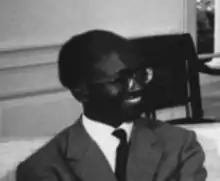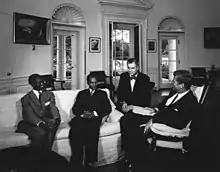Gaspard Cyimana
Gaspard Cyimana (May 30, 1930 – February 6, 1982) was a Rwandan politician, businessman, intellectual, and leader of independence. He was a top leader of the movement to abolish the Rwandan feudal monarchy and implement democracy in Rwanda.[1] As a Founding Father of the nation, he was one of the writers and 30 signers of the original Constitution of the Republic of Rwanda and Proclamation of the Republic of Rwanda.[2] Cyimana led the Tutsi-Hutu reconciliation wing of the Republican Democratic Movement–Parmehutu party and fought to unite the ethnicities under the national identity of Rwandan in the post-monarchical nation.[3] He served as the 1st Minister of Finance, Economic Affairs and Planning of Rwanda from 1960–1968.
Gaspard Cyimana | |
|---|---|
 | |
| 1st Minister of Finance, Economic Affairs and Planning of Rwanda | |
| In office 26 October 1960 – 12 June 1968 | |
| President | Gregoire Kayibanda |
| Preceded by | Office established |
| Succeeded by | Fidèle Nzanana |
| Personal details | |
| Born | May 30, 1930 Byumba, Rwanda |
| Died | February 6, 1982 (aged 51) |
| Nationality | Rwandan |
| Political party | MDR–Parmehutu |
| Spouse(s) | Agnes Verrycken (m. 1961) |
| Children | 3 |
| Alma mater | University of Antwerp |
Cyimana was considered one of the primary leaders of the new nation along with President Gregoire Kayibanda.[4][5] Cyimana played a critical role as Minister of Finance by securing essential foreign aid, establishing the national financial system, allocating half of the national budget to education, and maintaining a balanced budget. He resigned in 1968 over frustrations with corruption in the government. Cyimana served as a National Deputy and the President of the National Chamber of Commerce until his death. He became an entrepreneur for the rest of his life.
Early Life and Education
Gaspard Cyimana was born in Rulindo Rwanda on May 30, 1930 in the northern part of the country.[6]
Cyimana was described as a brilliant student graduating first in his class at the country's then most elite high school Saint Léon Minor Seminary of Kabgayi studying the classics.[7][8] Cyimana proceeded to study philosophy at the Grand Seminary of Nyakibanda where his continued academic excellence resulted in him being one of the first Rwandans to receive a scholarship to study abroad. Cyimana received his second university degree from the University of Lovanium in the Congo, studying Political and Administrative Studies.[9] At the time the University of Lovanium was considered the best university in Africa.[10] Cyimana became one of the only Rwandans to study in Europe, receiving another scholarship to study finance and economics in Belgium at the University of Antwerp.[11]
Cyimana became politically active during his studies in Belgium, staying in close contact with intellectuals in Rwanda.[12][13][14] Cyimana finished his studies in 1960 and was immediately appointed Minister of Finance in the provisional government upon his return to Rwanda.
Career

While an economics student in Belgium, Cyimana advocated for independence from Belgium and the dismantlement of the feudalistic Rwandan political system. In his two most prominent works, he argued for a more equitable distribution of political power between the three ethnic groups.[15] Cyimana also favored democracy as a way to return power to the people.[16] In the lead up to independence, Cyimana was selected to serve as Minister of Finance in the provisional government and then as the official Minister of Finance in the 1st government.[17][18] Cyimana continued to serve until his resignation in 1968.
During Cyimana's tenure, the government passed a balanced budget for the first time, made large investments in education, and financed the roads and infrastructure for the developing nation.[19]
Cyimana entered the private sector while maintaining other government posts following his time as Minister.
Personal life
Cyimana married Agnes Verrycken in 1961.[20] They had three children and one grandson.
References
- Davidson, R. (1967). The New Africans: Reuters guide to the contemporary history of emergent Africa and its leaders London, Paul Hamlyn, 1967
- Nkundabagenzi, Fidèle. Rwanda Politique. Bruxelles: The Centre, 1961. Print.
- Nkundabagenzi, Fidèle. Rwanda Politique (Page 198 and 366). Bruxelles: The Centre, 1961. Print.
- Société internationale de publications commerciales, culturelles et artistiques. Afrique. Paris: Société internationale de publications commerciales, culturelles et artistiques, 19611967.
- Ministère des affaires étrangères et du commerce extérieur. Services de l'information et des relations culturelles, Belgium. Ministère des affaires étrangères et du commerce extérieur, and du commerce extérieur et de la coopération au développement Belgium. Ministère des affaires étrangères. Memo From Belgium
- Davidson, R. (1967). The New Africans: Reuters guide to the contemporary history of emergent Africa and its leadersLondon, Paul Hamlyn, 1967
- MLA Citation Belgium. Ministère des affaires étrangères et du commerce extérieur. Services de l'information et des relations culturelles, Belgium. Ministère des affaires étrangères et du commerce extérieur, and du commerce extérieur et de la coopération au développement Belgium. Ministère des affaires étrangères. Memo From Belgium. Brussels: Information Services, Ministry of Foreign Affairs and External Trade,
- Davidson, R. (1967). The New Africans: Reuters guide to the contemporary history of emergent Africa and its leadersLondon, Paul Hamlyn, 1967
- Davidson, R. (1967). The New Africans: Reuters guide to the contemporary history of emergent Africa and its leadersLondon, Paul Hamlyn, 1967
- Africa 24, « Rd congo, Repositionner l'UNIKIN comme pôle d'excellence » [archive], sur africa24tv.com, chaîne d’information, 29 octobre 2015 (consulté le 12 décembre 2019)
- Davidson, R. (1967). The New Africans: Reuters guide to the contemporary history of emergent Africa and its leadersLondon, Paul Hamlyn, 1967
- Davidson, R. (1967). The New Africans: Reuters guide to the contemporary history of emergent Africa and its leadersLondon, Paul Hamlyn, 1967
- Belgium. Ministère des affaires étrangères et du commerce extérieur. Services de l'information et des relations culturelles, Belgium. Ministère des affaires étrangères et du commerce extérieur, and du commerce extérieur et de la coopération au développement Belgium. Ministère des affaires étrangères. Memo From Belgium. Brussels: Information Services, Ministry of Foreign Affairs and External Trade
- Ministère des affaires étrangères et du commerce extérieur. Services de l'information et des relations culturelles, Belgium. Ministère des affaires étrangères et du commerce extérieur, and du commerce extérieur et de la coopération au développement Belgium. Ministère des affaires étrangères. Memo From Belgium
- Gaspard Cyimana, “Plaidoyer pour le menu peuple au Rwanda-Burundi, article du 15 mars 1959”
- Nkundabagenzi, Fidèle. Rwanda Politique. Bruxelles: The Centre, 1961. Print.
- Tsuruta, Aya. “‘It is difficult to understand Rwandan history’: contested history of ethnicity and dynamics of conflicts in Rwanda during Revolution and Independence.” 2014.
- “LE RUANDA A UN NOUVEAU GOUVERNEMENT.” Le Monde, 11 Nov. 1965.
- Kigali, Carrefour d'Afrique, French, February 1968, pp 10-11
- “Love Finds a Way.” Jet Magazine, 11 Jan. 1962, p. 36.